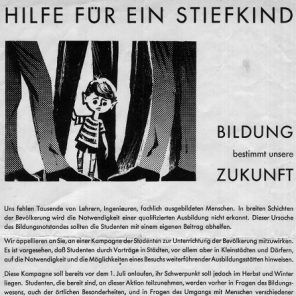The “Students to the Country” Initiative

Better educational opportunities for children from families of farmers and laborers: This was the goal that students pursued in 1965 with their campaign “Student to the Country” (Student aufs Land). Accordingly, they swapped lecture halls for community halls and classes for self-organized lecture evenings.
Freiburg students organized the “Student to the Country” campaign in 1965, in the spirit of the student protests and as a measure against the “educational state of emergency” (Bildungsnotstand), a slogan for criticism of the educational system in the mid 1960s. The complaints included “overcrowded lecture halls and poorly equipped universities”1 as well as “insufficiently equipped schools, a lack of teachers, and poor teacher training.”2 The fact that hardly any working-class and female school students pursued an academic education was another source of resentment, as was the uneven distribution of educational opportunities between the urban and rural population, which was also reflected in a disparity between Catholic and Protestant regions.3
It was not enough for the Freiburg students to demonstrate with pithy slogans on banners for better educational opportunities of children from farming and working-class families, only two to five percent of whom were enrolled at a university at the time. The young women and men wanted to start at the grassroots level – so they went out into the villages and communities of South Baden from Lahr to Lörrach. They organized lecture evenings in which they tried to convince an audience of parents, teachers, and politicians to make it possible for the next generation to attend a secondary school.4 The dedication was great: “By mid-March 1965, one hundred and twenty student speakers and drivers who had refused to take any renumeration aside from reimbursement for their direct expenses had driven forty thousand kilometers and held lectures in front of around eighteen thousand people in four hundred rural districts.”5
The educational campaign achieved its aim. The Freiburg student Ignaz Bender states in his article “Student aufs Land,” published in the weekly newspaper Die Zeit in 1966, that 32.7 percent more children than in the previous year were enrolled in middle-tier secondary schools in South Baden, as compared to the state average of only 15.3 percent. Moreover, he states that the Freiburg initiative also inspired students from Saarbrücken, Heidelberg, Tübingen, and Munich.6 In addition to media attention, the hitherto unique campaign also received national recognition. In 1967, it was awarded the Theodor Heuss Medal under the year’s motto “Responsibility is a civic duty” by the nonpartisan Theodor Heuss Foundation, named after the first President of the Federal Republic of Germany.7
The “Student to the Country” initiative shows what positive changes are possible when universities and society enter into a dialogue and work together to overcome societal challenges. At the same time, it demonstrates that as an educational institution, the university sees itself as an open space for all citizens in the interests of equal opportunities.
- Translated from: https://www.hdg.de/lemo/kapitel/geteiltes-deutschland-modernisierung/bundesrepublik-im-wandel/bildungsnotstand.html ↩︎
- Translated from: https://www.hdg.de/lemo/kapitel/geteiltes-deutschland-modernisierung/bundesrepublik-im-wandel/bildungsnotstand.html ↩︎
- https://www.hdg.de/lemo/kapitel/geteiltes-deutschland-modernisierung/bundesrepublik-im-wandel/bildungsnotstand.html ↩︎
- https://www.zeit.de/1966/13/student-aufs-land ↩︎
- https://www.zeit.de/1966/13/student-aufs-land ↩︎
- https://www.zeit.de/1966/13/student-aufs-land ↩︎
- https://www.theodor-heuss-stiftung.de/thp/1967-2/ ↩︎